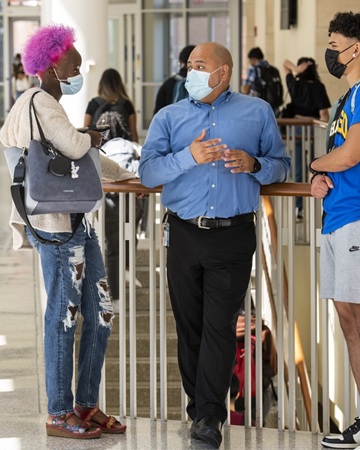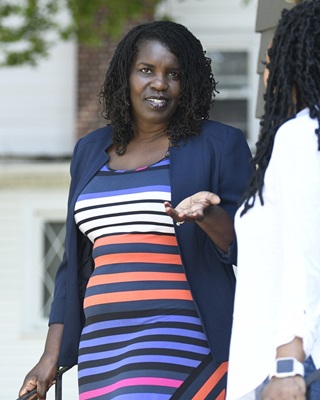Our New Pathway: A Focus on Equity
TBF News Spring 2022
On April 4th the Boston Foundation’s President and CEO Lee Pelton announced the first major evolution of TBF’s strategic vision in more than a decade. Called Our New Pathway, it was developed in collaboration with the Foundation’s staff and board after numerous conversations with people in the community we serve.
“Our New Pathway was inspired by the triple pandemic of COVID-19, the economic devastation it caused and the very public exposure of the racial disparities that have plagued our country and our city for far too long,” explained Pelton in a video that was sent to all of the Foundation’s stakeholders—from donors to nonprofit partners to business and civic leaders to elected officials. Pelton joined the Foundation in the midst of the pandemic and shortly after the murder of George Floyd.
He explained that the new strategic vision places equity at the heart of everything the Boston Foundation does going forward. Our New Pathway also leans into the Foundation’s role as a civic leader, which is built on collecting data and commissioning research, convening conversations and using our shared knowledge to work closely with others to advocate successfully for deep systems change.
REPAIR AND BUILD
“There are two other major commitments that we all must make to move forward the ambitious goal of equity for everyone,”says Pelton. “First, we need to work together to repair the threadbare social fabric in which we function. Repair is about restorative justice. It calls on us to see the harm that has been done, try to understand it and find a way to redress it from a shared space.”
In this spirit, the Foundation is presenting a three-part series of dialogues on the subject of reparations. In the first, Pelton and King Boston Executive Director Imari Paris Jeffries explored the history of the issue with UMass Boston Africana Studies Department Chair Dr. Jemadari Kamara. The second dialogue sought a national perspective through the insights of elected leaders undertaking reparations efforts in their municipality or state.
“But we all know that repairing the damage is not enough,” adds Pelton. “All of us must use our resources to build—to encourage new ideas, create and support promising enterprises and contribute to the common good in any way that we can.”
The lines between “repair” and “build” often blur, such as in the area of wealth building through homeownership. For many decades redlining—or the process through which Residential Security Maps were used to signal banks and investors that neighborhoods where Black families resided were high-risk investments—led to the denial of access to the economic opportunity that comes with homeownership.
According to the Boston Political Review, although redlining occurred nationwide, racial segregation in Boston was especially egregious. And so, current efforts to help people of color participate in homeownership is a way of repairing the injustices of the past while building wealth for thousands of Bostonians.
On April 26th, Mayor Wu and Massachusetts Affordable Housing Alliance (MAHA) announced a historic $106 million commitment to affordable homeownership, focusing on serving first-time and first-generation homebuyers of color. At the press conference, MAHA Executive Director Symone Crawford said, “We are thrilled that Mayor Wu and our city councilors understand the needs of thousands of MAHA members and graduates.”
MAHA was established more than 30 years ago by a group of determined women who fought hard to reverse a decades-long pattern of disinvestment in low- and moderate-income homebuyers. Since then, MAHA has begun to change the landscape in Massachusetts. More than 40,000 potential homebuyers have taken MAHA homebuyer classes and 23,000 homebuyers have purchased their first homes, the majority people of color. Symone Crawford says the racial wealth gap and the racial homeownership gap are intertwined. “We need to get people of color into homes and allow them to build equity. Ultimately, homeownership leads to a better quality of life.”
A strong supporter of MAHA for decades, the Boston Foundation also is making an investment in a new pilot program launched by Opportunity Communities called Homes for Equity. The program will be launched in Roxbury, which has been targeted by redlining for many decades and where almost 90 percent of the population is Black, Latinx or Asian. “Many talk about building wealth for Black and Brown households,” says Ann Houston, CEO of Opportunity Communities. “We have a bold plan to do just that.


